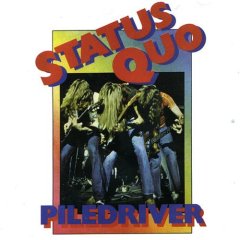Songs
The opening song, "Don't Waste My Time" was written by Francis Rossi and Bob Young in the soon-to-be trademark shuffle style the group would become famous for. The lyrics complain about a girl not being serious about a relationship and messing around. The song became a live favourite, and frequently got audiences bouncing around at gigs.
"Paper Plane" was written by Rossi and Young; the lyrics included a reference to the Mercedes-Benz 600 used by the band, which they called a "three grand Deutsche car". It was the album's only single, with the B-side "Softer Ride" (written by Rick Parfitt and Alan Lancaster), which was to become the first in a sequence of thirty-three Top 40 hits on the UK Singles Chart when it peaked at #8 after its release in November 1972. The B-side would later be incorporated into the band's following album, Hello! , released the following year.
The group heard the Doors' "Roadhouse Blues" while touring Bielefeld, Germany, in 1970, and enjoyed its 12-bar shuffle, using it as a template for other songs. The group's arrangement was longer than the original, featuring another verse and three-part harmony vocals.
Reception
The album was released in December the same year, and reached the highest position of #5 in the UK charts, spending 37 weeks there. [13]
In a retrospective review, AllMusic applauded the album as both crowd-pleasing and moderately ambitious, commenting that "Despite the name, most of the music on Piledriver is varied and subtle enough to be interesting." They particularly praised "A Year" and "Big Fat Mama". [10] The Village Voice critic Robert Christgau asserted that the band had no decent singer or guitarist, and criticized their attempts at ballads and blues as "boring". [11]
This page is based on this
Wikipedia article Text is available under the
CC BY-SA 4.0 license; additional terms may apply.
Images, videos and audio are available under their respective licenses.
